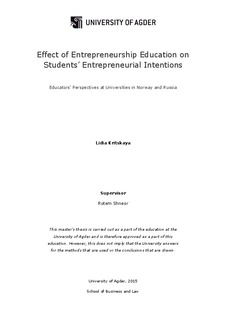| dc.description.abstract | Øyvind Gustavsen (2013) explains that entrepreneurs, as creators of the employment places, are the most important drivers of economy development. Just in the period 2002-2007 in Norway, 248,000 new job places were developed in the companies younger than 5 years old, while 181,000 jobs disappeared at the companies older than 5 year. Therefore, when aiming to inspire entrepreneurship behavior (EB) and improvement of the quality of new start-ups and innovation, governments create programs, which strive to develop a cooperation between universities, schools, business and research institutions (Gustavsen, 2013 ).
Bakotic and Kruzic (2010) state, that students are generators of the future economic development. Their entrepreneurial attitudes and behavior determine the future business activities and sustainability of economy (Bakotic & Kruzic, 2010). The Global Report (2014) of the Global Entrepreneurship Monitor (GEM) states that proactive approach in the developing of EB and enhancing entrepreneurial intentions requires consistent improving of entrepreneurship education (Singer, Amorós, & Arreola, 2015).
The research literature within entrepreneurial intentions confirms that entrepreneurship education programs are the right and effective tool to enhance entrepreneurial intentions. However, researchers are inconsistent about their findings. One of the possible reasons to the inconsistency is the lack of any qualitative exploratory research papers within this particular topic. The other reason is the complexity of the “entrepreneurship” phenomenon. As a result, methodological biases and self-assessed questionnaires of students lead to the incomparable research findings.
This master thesis deals with entrepreneurial intentions of students because of its potential effect on future context of entrepreneurship and economics impact. Educators’ perspective was chosen to view the entrepreneurship education – entrepreneurial intentions relationship from the other perspective based on instructors’ work and experience. It allowed finding variables which were neglected by the research based only on the students’ perspective. Two countries, Russia and Norway, research allowed to separate common for EE and dependent from the culture variables. The qualitative multiple case study design was chosen as a tool for the theory development study.
Key Words: Entrepreneurship, Entrepreneurship Education, Entrepreneurship Education Program, Enterprise Education, Entrepreneurial Education, Entrepreneurial Intentions, Entrepreneurial Intent, Self-employment, Career-choice | nb_NO |
